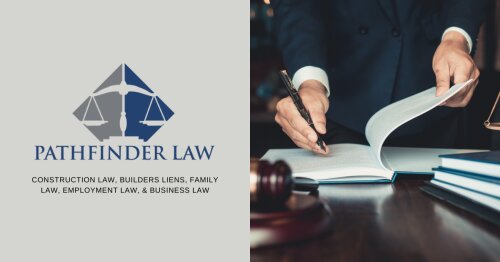Best Tax Lawyers in Abbotsford
Share your needs with us, get contacted by law firms.
Free. Takes 2 min.
List of the best lawyers in Abbotsford, Canada
About Tax Law in Abbotsford, Canada
Tax law in Abbotsford, British Columbia is governed by a combination of federal and provincial legislation. Residents and businesses are required to comply with tax obligations established by the Canada Revenue Agency (CRA) and the British Columbia Ministry of Finance. Tax law encompasses income tax, corporate tax, property tax, goods and services tax (GST), and more. The procedures, deadlines, and complexities can impact individuals, homeowners, entrepreneurs, and professionals in the Abbotsford region.
Why You May Need a Lawyer
There are numerous scenarios in which legal assistance for tax matters may be necessary in Abbotsford:
- Disputes or audits with the CRA or provincial tax authorities
- Complex tax planning for businesses or high-net-worth individuals
- Appealing tax assessments or addressing overpayment or underpayment issues
- Estate planning and the tax implications of inheritances or gifts
- Dealing with late filings, penalties, or interest charges
- Navigating GST or PST issues for business owners
- Addressing tax implications in property transfers, sales, or development
- Assistance in bankruptcy or insolvency situations involving tax debt
A tax lawyer can provide legal support, explain your rights, represent you before government agencies, and help ensure compliance with all relevant laws and regulations.
Local Laws Overview
Abbotsford is subject to both federal and provincial tax laws. The key elements include:
- Income Tax: Applies to personal, business, and corporate incomes; administered by the CRA at the federal level and by the British Columbia Ministry of Finance at the provincial level.
- Goods and Services Tax (GST): A federal tax of 5 percent on most goods and services in Canada.
- Provincial Sales Tax (PST): In British Columbia, PST is currently 7 percent on most goods and some services.
- Property Tax: Levied by the City of Abbotsford based on the assessed value of real estate property. This tax funds local services such as schools, policing, and infrastructure.
- Capital Gains Tax: Tax applicable on profits from the sale of certain assets, including real estate.
- Compliance Requirements: A range of rules for filing returns, remittances, record-keeping, and claiming credits or deductions.
Penalties for non-compliance can include interest, fines, and, in severe cases, criminal prosecution. Taxpayers have legal rights to dispute or appeal assessments.
Frequently Asked Questions
What types of tax are residents of Abbotsford required to pay?
Residents may be required to pay income tax, GST, PST, property tax, and other specific taxes depending on their personal or business activities.
Who administers tax law in Abbotsford?
Tax is primarily administered by the Canada Revenue Agency (federal taxes) and the British Columbia Ministry of Finance (provincial taxes). Property taxes are handled by the City of Abbotsford.
When is the deadline to file a personal income tax return in Canada?
For most individuals, the personal tax return deadline is April 30 of each year. Self-employed individuals have until June 15 to file, but payment deadlines remain April 30.
What should I do if I receive a tax assessment that I disagree with?
You have the right to file a formal objection with the CRA or appropriate provincial agency within the specified time limit. Consulting a tax lawyer can help strengthen your case.
How does property tax work in Abbotsford?
Property tax is calculated based on the assessed value of your property and the current municipal tax rate. Taxes are paid annually and fund municipal services.
Am I required to register for GST or PST as a small business owner?
If your business earns more than the minimum threshold (currently 30,000 dollars annually), you must register for GST. Rules for PST are set by the province and may be required for certain goods or services.
What happens if I do not pay my taxes on time?
Failure to pay taxes can result in interest charges, late penalties, and potential legal action by tax authorities. It is important to address any outstanding tax as soon as possible.
Can a tax lawyer help with tax planning?
Yes, tax lawyers assist with tax-efficient structures for both individuals and businesses, minimizing liabilities while staying compliant with the law.
What are the tax implications of selling a home in Abbotsford?
If the home is your primary residence, you may be exempt from capital gains tax on its sale. However, if it is a rental or investment property, capital gains tax may apply.
How do I find a qualified tax lawyer in Abbotsford?
You can research local law firms, use provincial law society directories, or ask for referrals from professionals. Contacting the Law Society of British Columbia is also a good way to confirm a lawyer's credentials.
Additional Resources
Various organizations and governmental bodies offer information and assistance related to tax matters in Abbotsford:
- Canada Revenue Agency (CRA) - Offers guides, forms, and assistance for federal taxes
- British Columbia Ministry of Finance - Handles provincial tax matters including PST
- City of Abbotsford - Provides property tax assessments and payment information
- Law Society of British Columbia - Directory of qualified lawyers and tips for hiring legal help
- People’s Law School - Public legal education resources on tax and other legal topics
- Access Pro Bono - Free legal clinics and information for those who qualify
Next Steps
If you need legal assistance with tax matters in Abbotsford:
- Gather all relevant documents and correspondence, such as tax returns, assessment notices, or CRA letters
- Define your specific legal issue or question
- Contact a local tax lawyer to arrange a consultation and discuss your case in detail
- Prepare a list of questions or concerns to address with the lawyer
- Follow up on the lawyer’s advice and promptly meet any deadlines or requirements
Acting quickly when faced with a tax issue can make a significant difference. Qualified legal professionals can guide you through complex tax laws, represent your interests, and help you achieve the best possible outcome.
Lawzana helps you find the best lawyers and law firms in Abbotsford through a curated and pre-screened list of qualified legal professionals. Our platform offers rankings and detailed profiles of attorneys and law firms, allowing you to compare based on practice areas, including Tax, experience, and client feedback.
Each profile includes a description of the firm's areas of practice, client reviews, team members and partners, year of establishment, spoken languages, office locations, contact information, social media presence, and any published articles or resources. Most firms on our platform speak English and are experienced in both local and international legal matters.
Get a quote from top-rated law firms in Abbotsford, Canada — quickly, securely, and without unnecessary hassle.
Disclaimer:
The information provided on this page is for general informational purposes only and does not constitute legal advice. While we strive to ensure the accuracy and relevance of the content, legal information may change over time, and interpretations of the law can vary. You should always consult with a qualified legal professional for advice specific to your situation.
We disclaim all liability for actions taken or not taken based on the content of this page. If you believe any information is incorrect or outdated, please contact us, and we will review and update it where appropriate.











